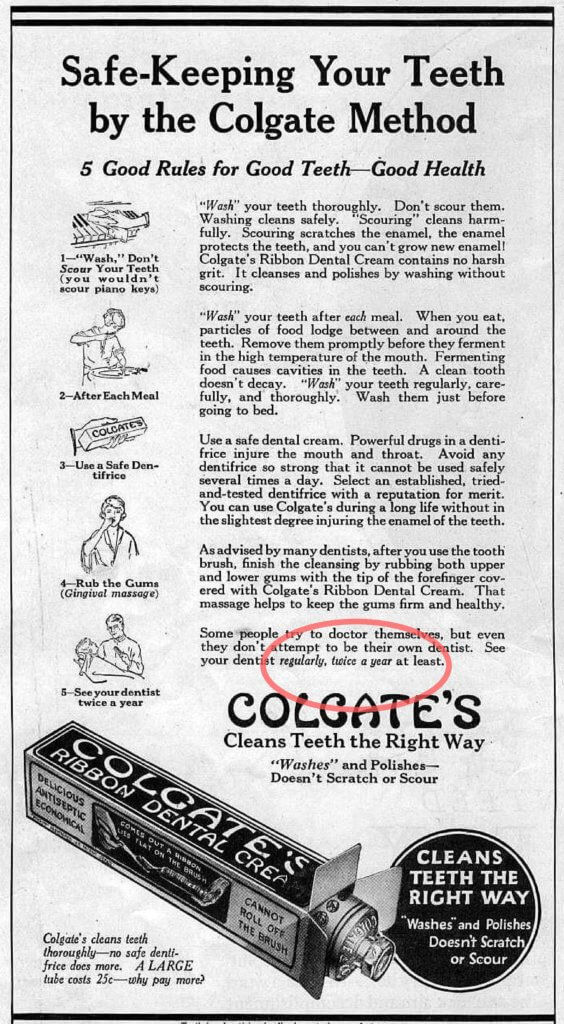
Take a look at the list of 7 top risk factors for periodontal disease. Did you find that at least one of them applies to you? Those risk factors result in enamel damage, inflammation, and a decreased ability of your body to fight infection.
Your unique combination of these risk factors will dictate how likely you are to experience periodontal disease. If you have more than one, you should consider seeing your dentist more than twice a year. Let me explain.
For many people, seeing the dentist twice a year isn’t enough.
This twice-a-year model was started by Colgate in the 1950s to convince people they needed to be proactive about their oral health. Colgate’s advertisements encouraged readers to brush their teeth for 2 minutes and see their dentist twice a year AT LEAST.
Twice a year is a minimum. Seeing your dentist twice a year can be enough if you are already in excellent oral health, diligent about your oral hygiene, and don’t have any major risk factors.
The BEST way to determine how often you need to go to the dentist is to ask your dentist. Together we can identify your potential risk factors and formulate a plan to keep you in peak oral health.

“Wait, my dentist will tell me how often I have to come in?”
I know that at least one person reading this is worried that their dentist will take advantage of them.
If you are afraid that your dentist will want to schedule you for a cleaning once a week to make more money, then you are seeing the wrong dentist and should find one you trust right away. Would you have this concern if your cardiologist told you you needed a specific procedure? Or if your doctor wanted to see you for a follow-up appointment in a few weeks? Probably not. Your dentist shouldn’t be any different. He/she is trained to know what steps to take to get your oral health on the right track. No honest health practitioner of any kind would ask you to come in more than is necessary or suggest procedures you don’t need. Always feel free to get a second opinion, but be sure they do a periodontal screening, and don’t start off by immediately telling them what you need — that way you’ll get an unbiased picture of what they would recommend too.
Choose a dentist you trust and who will make a personalized plan to keep you healthy.
As a dentist, the best thing I can do for my practice is to create happy, healthy patients who trust me with their oral health. As my patient, you and I are going to have a better relationship if I can save your teeth while also saving you money, time, and the anxiety of going through major procedures.
Telling your dentist about medical conditions, medications, nutritional habits, grinding, smoking, life stresses, etc., are all things a great dentist can take into account when creating an oral health plan for you.
For Example –
One new patient maintains excellent oral hygiene and is fortunate to have good oral genetics. However, she grinds her teeth, drinks too much coffee, and has a stressful job. This young lady got her first three cavities all at once because her enamel gave out. Her coffee habit, her elevated stress levels, and forgetting to wear her nightguard all took a toll.
After some discussion, she decided to go ahead with a new recommended plan for her to receive cleanings 4 times a year. These additional cleanings help us keep a close eye on the compromised areas, and help avoid any further in-depth procedures. Her frequent visits mean that she’s always confident about the health of her mouth and doesn’t have anxiety between visits.
This patient ends up paying a little more for the extra cleanings because her insurance only covers 2 per year. However, the additional cost is less than having cavities filled.
*Bonus: Cleaning appointments are more pleasant than getting fillings.
Don’t let your insurance dictate what treatments you will receive.
Insurance companies are designed to pay as little as possible for your care. They aren’t concerned with preventative treatments for your specific oral health needs. Remember, while insurance companies can be helpful, they ultimately are businesses who have to answer to investors; your dentist answers to YOU and the dental board. Your dentist is there to guide you through a lifetime of oral health. Ask their opinion!
